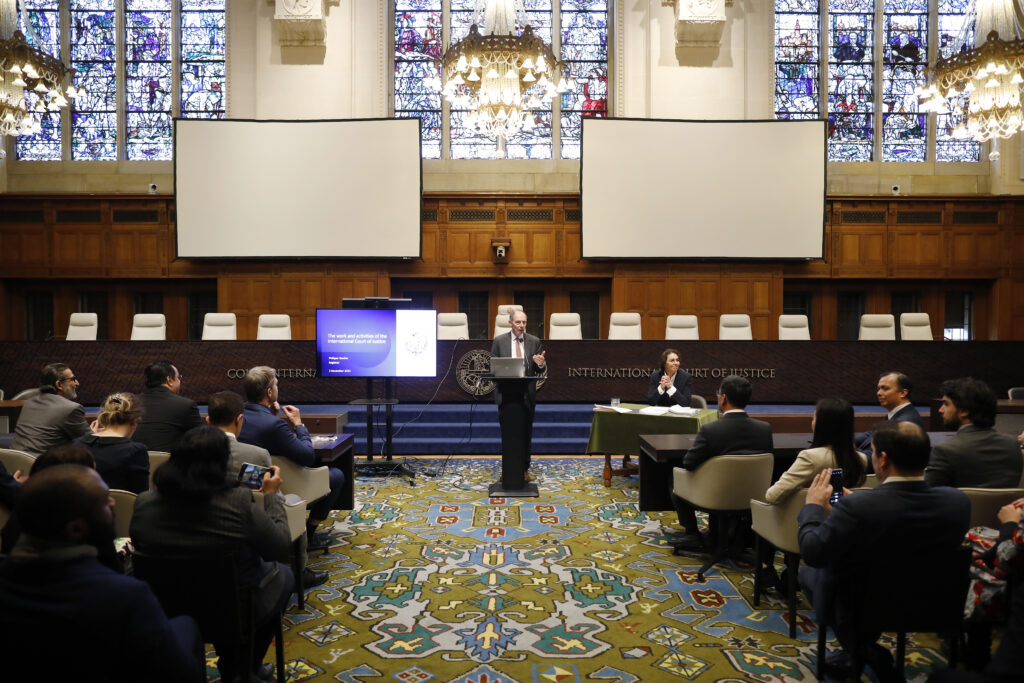- The International Court of Justice plays a crucial role in resolving disputes between sovereign states;
- Its jurisdiction is limited to matters of public international law, focusing on the peaceful resolution of conflicts;
- By issuing decisions based on principles of impartiality and justice, the ICJ consolidates the rule of international law, promotes preventive diplomacy and guides future interpretations of international law.
In the world of global diplomacy, the International Court of Justice (ICJ) is essential in resolving conflicts between countries, highlighting its importance in International Relations.
The ICJ began after the First World War and became part of the United Nations in 1945. It is like a judge for international issues. Therefore, it is interesting to know about its history, how it works and why it is so important. It is also useful to look at important cases that have had an impact around the world.

What is the International Court of Justice in The Hague and how was it created?
Widely known as the “World Court,” the ICJ is one of the six “principal organs” of the United Nations, on the same level as the General Assembly, the Security Council, the Economic and Social Council, the Trusteeship Council, and the Secretariat, and the only one of these entities not located in New York.
After World War II, the need for an effective international court became more evident. The United Nations Charter, adopted in 1945, provided for the establishment of an International Court of Justice as one of the UN’s six principal organs. Thus, the ICJ was officially established in 1945 when the United Nations Charter came into effect.
The ICJ is, therefore, the only global court responsible for resolving disputes between the 193 member countries of the UN. Its role is fundamental in promoting peace and global security by providing a means for countries to resolve their issues without resorting to war.
In the face of conflict, any member country has the right to sue another, even if they are not directly involved, and the decisions of the ICJ are final and cannot be contested.
How does the jurisdiction of the ICJ work and how does it apply to disputes between States?
The jurisdiction of the International Court of Justice (ICJ) is limited to matters of public international law and is focused on the resolution of disputes between sovereign states.
The International Court of Justice (ICJ) can adjudicate cases involving legal disputes between States (countries), including cases related to genocide, war crimes, crimes against humanity, and aggression, provided that these cases are disputes between two or more States and involve allegations of violations of international law.
However, it is important to note that the ICJ does not have direct jurisdiction over criminal proceedings against individuals. These types of crimes are usually tried by specific courts, such as the International Criminal Court (ICC), which is responsible for judging individuals accused of the crimes mentioned above, regardless of the ICJ.
For example, in the hypothetical situation where there was a legal dispute between two or more countries related to the Holocaust, the International Court of Justice (ICJ) could be called upon to judge the responsibility of Nazi Germany as a State for violations of international law, including the genocide perpetrated during the Holocaust. However, individually, Nazi leader Adolf Hitler would not be tried by the ICJ, as the ICJ’s jurisdiction focuses on disputes between States.
On the other hand, individuals like Adolf Hitler would fall under the jurisdiction of the International Criminal Court (ICC) or other international criminal tribunals for cases related to crimes of the same nature.
The International Court of Justice (ICJ) has two main ways of assisting:
- Contentious Jurisdiction: The ICJ can resolve legal conflicts between countries. But both countries need to agree to take the case to the ICJ. If one country does not want to, the ICJ cannot help.
- Advisory Opinion: Sometimes, the ICJ provides legal advice on issues raised by UN bodies, such as the General Assembly or the Security Council. These opinions are not binding, but they help understand the law on certain matters.
The case brought by South Africa against Israel on December 29, 2023, marks the first time a contentious case has been brought against Israel at the ICJ.
How are ICJ judgments enforced to ensure justice?
Enforcement of International Court of Justice (ICJ) decisions is complex and requires the cooperation of the countries involved. Unlike local courts, the ICJ cannot directly force countries to obey its decisions.
As mentioned earlier, the authority of the ICJ comes from the consent of countries to accept its rules and follow its decisions. Here are some ways to ensure ICJ decisions are followed:
- Voluntary Cooperation: States involved in the dispute usually voluntarily cooperate to implement ICJ decisions. This may involve negotiating agreements and mutual commitments to comply with the court’s determinations.
- International Pressure: The international community, including other states and international organizations, can exert diplomatic pressure on states to comply with ICJ decisions. Reputation and international prestige are factors that often encourage states to respect legal obligations.
- Peaceful Conflict Resolution: By resolving disputes in a legal and peaceful manner, the ICJ contributes to stability and confidence in the international system. Proper resolution of conflicts can encourage states to comply with court decisions to maintain positive relations with other members of the international community.
- Sanctions and Retaliatory Measures: In extreme cases, if a state persists in disrespecting ICJ decisions, other states or organizations may consider imposing sanctions or retaliatory measures. However, this is a delicate measure and often faces political and legal challenges.
It is important to understand that in the international community, there is no single authority that can enforce ICJ decisions obligatorily. Respect for international rules depends mainly on countries’ commitment to follow the standards established by the ICJ and other international legal agreements.
If a country fails to follow the obligations determined by an ICJ decision, the only remaining recourse is the Security Council, which can approve a resolution, as established in the United Nations Charter. This occurred in a case where Nicaragua sued the United States in 1984, as mentioned below.
What were the most emblematic cases judged to date?
To date, the International Court has judged several notable cases. Some of these cases include:
- Corfu Channel Case (United Kingdom vs. Albania, 1949): The UK accused Albania of mining its ships in the Corfu Channel. The ICJ ruled that Albania violated international law and ordered compensation. The case was closed with Albania agreeing to pay the compensation determined by the Court.
- Genocide Case (Bosnia and Herzegovina vs. Serbia and Montenegro, 2007): Bosnia accused Serbia of failing to prevent genocide in Srebrenica during the Bosnian War. The ICJ found that Serbia violated the duty to prevent genocide and ordered compensation. The case was closed with Serbia agreeing to compensate Bosnia for the damages caused during the genocide in Srebrenica.
- Military and Paramilitary Activities in Nicaragua Case (Nicaragua vs. United States, 1986): Nicaragua accused the US of military intervention. The ICJ ruled in favor of Nicaragua, declaring that the US violated international law, and that Washington should pay reparations for the damages, including indemnity. The US refused to accept the conclusion, so Nicaragua took the matter to the Security Council, where a resolution was vetoed by the United States itself.
- Kasikili/Sedudu Case (Namibia vs. Botswana, 1999): Border dispute between Namibia and Botswana over river islands. The ICJ determined sovereignty over the islands in favor of Botswana. The case was closed with Namibia accepting the Court’s decision and recognizing Botswana’s sovereignty over the islands.
- Corfu Island Bridge Case (Albania vs. Greece, 2009): Dispute over the sovereignty of Corfu Island. The ICJ ruled in favor of Albania. The case was closed with Greece recognizing and respecting the decision of the International Court.
In relation to the most recent cases:
- Ukraine vs. Russia Case (ongoing): Kiev accused Russia of violating the Genocide Convention during the War in Ukraine. However, Russia contested the jurisdiction of the ICJ, but the legal battle reached a new stage in February 2024 with the decision of the International Court of Justice (ICJ).
While the ICJ recognized that parts of Ukraine’s case against Russia could proceed, related to the allegation that Russia financed separatists in eastern Ukraine and used false
accusations of genocide as justification for the 2022 invasion, other issues were set aside, as in January 2024 the ICJ declared that only money transfers could be considered support for alleged “terrorist” groups under the terms of the international convention on terrorism financing.
The crucial point is that the ICJ will not examine whether Russia violated the Genocide Convention of 1948 by using the allegation of genocide as a pretext for war, although the invasion likely violated international law. Instead, the case will focus on determining whether Ukraine committed genocide in the eastern parts of the country, as claimed by Russia.
The tribunal’s decision was based on jurisdiction and the need for credible evidence. This means that Ukraine seeks a declaration from the ICJ that it did not commit genocide, but a final decision is still far off.
In parallel, the International Criminal Court (ICC) is investigating crimes committed in any part of Ukraine’s territory by any individual from November 21, 2013, onwards, including the Revolution of Dignity, the Russo-Ukrainian War, including the annexation of Crimea in 2014 by Russia, the war in Donbas, and the Russian invasion of Ukraine in 2022.
- Israel and Palestine Case (ongoing): After South Africa sued Israel for genocide in Gaza, South African lawyers are preparing a case against the United States and the United Kingdom, alleging complicity in Israel’s war crimes. The ICJ, also located in The Hague, is already investigating possible war crimes and crimes against humanity committed by both Hamas and Israel. But without any action so far.
After South Africa sued Israel for alleged genocide during its operations in Gaza, South African lawyers are now preparing an additional case against the United States and the United Kingdom. They argue that these countries are complicit in the war crimes committed by Israel.
On January 26, the ICJ issued an order requiring Israel to take steps to prevent genocide in Gaza. However, after the decision, Israeli attacks continued, resulting in the deaths of thousands of Palestinians in the following month.
Israel is expected to submit a report to the ICC about its actions to comply with the order, but South Africa, which brought the case to the court, stated that Israel has not complied with the measures.
Meanwhile, the supply of humanitarian aid to Gaza has been obstructed, intensifying the suffering of the population. Now, the question is whether Israel will face UN sanctions for not following the ICJ’s orders.
At the same time, hopes for accountability for war crimes in Gaza are focused on the International Criminal Court (ICC) and its prosecutor, Karim Khan, who has pledged to make full use of the force of law to bring justice to Israeli and Palestinian victims.
In 2021, the ICC decided that its criminal jurisdiction includes the Palestinian territories of Gaza, the West Bank, and East Jerusalem, initiating a formal investigation into violence in the region since 2014.
This gives Khan the authority to investigate war crimes committed by all parties, including Hamas in Israel in October 2021 and Israel’s military response in Gaza. But efforts by Israel and the United States to delegitimize Khan’s mandate could hinder the investigation and perpetuate impunity.
What is the geopolitical importance of the ICJ in the international community?
The International Court of Justice plays a crucial role in the international community, especially in conflict situations like those involving Ukraine and Gaza. Its importance can be seen in various ways:
- Peaceful Dispute Resolution: The ICJ offers states a legal avenue to resolve disputes without resorting to violence or armed conflict. This promotes international stability and security, contributing to the prevention of crises and wars.
- Consolidation of the Rule of International Law: By issuing decisions and opinions based on principles of international law, the ICJ helps consolidate and develop the rule of international law. This strengthens the norms and rules governing relations between states, promoting order and predictability.
- Promotion of Justice and Equity: The ICJ seeks to promote justice and equity in dispute resolution. Its decisions are based on principles of impartiality, equality, and justice, contributing to the construction of a more just international system.
- Prevention of Abuses and Disrespect for International Law: The ICJ seeks to act as an impartial arbiter in disputes, dissuading states from violating international norms and treaties. Fear of legal consequences can deter behaviors that violate international law.
- Creation of Legal Precedents: ICJ decisions establish precedents that influence future interpretations and applications of international law. These precedents can guide states in their actions and contribute to the development of international law.
- Promotion of Diplomacy: The possibility of bringing disputes to the ICJ encourages states to seek diplomatic solutions before resorting to unilateral actions. This fosters preventive diplomacy and negotiation as preferred means of conflict resolution.
In the specific case of Ukraine and Gaza, the intervention of the ICJ is crucial to ensure that allegations of violations of international law are properly investigated and addressed. Amid complex disputes and geopolitical tensions, the presence of an impartial court can help prevent escalation of conflict and promote a fair and equitable solution, with hope that countries will adhere to its decisions.
Furthermore, by promoting preventive diplomacy and negotiation as preferred means of conflict resolution, the ICJ contributes to international stability and security, creating an environment conducive to the peaceful development of relations between states.
However, although the International Court of Justice issues decisions, it does not have direct means to ensure that countries comply with them. This is due to the lack of a global authority that can enforce such decisions and ensure that government leaders obey them.
In other words, there is no kind of “world police” that can ensure the enforcement of international judicial decisions. This highlights the challenges faced by the international community in ensuring the effectiveness of the global judicial system and the need for cooperation among countries to strengthen respect for international law.





Be First to Comment